19 Of the Best Sustainably Farmed Wines to Drink Now
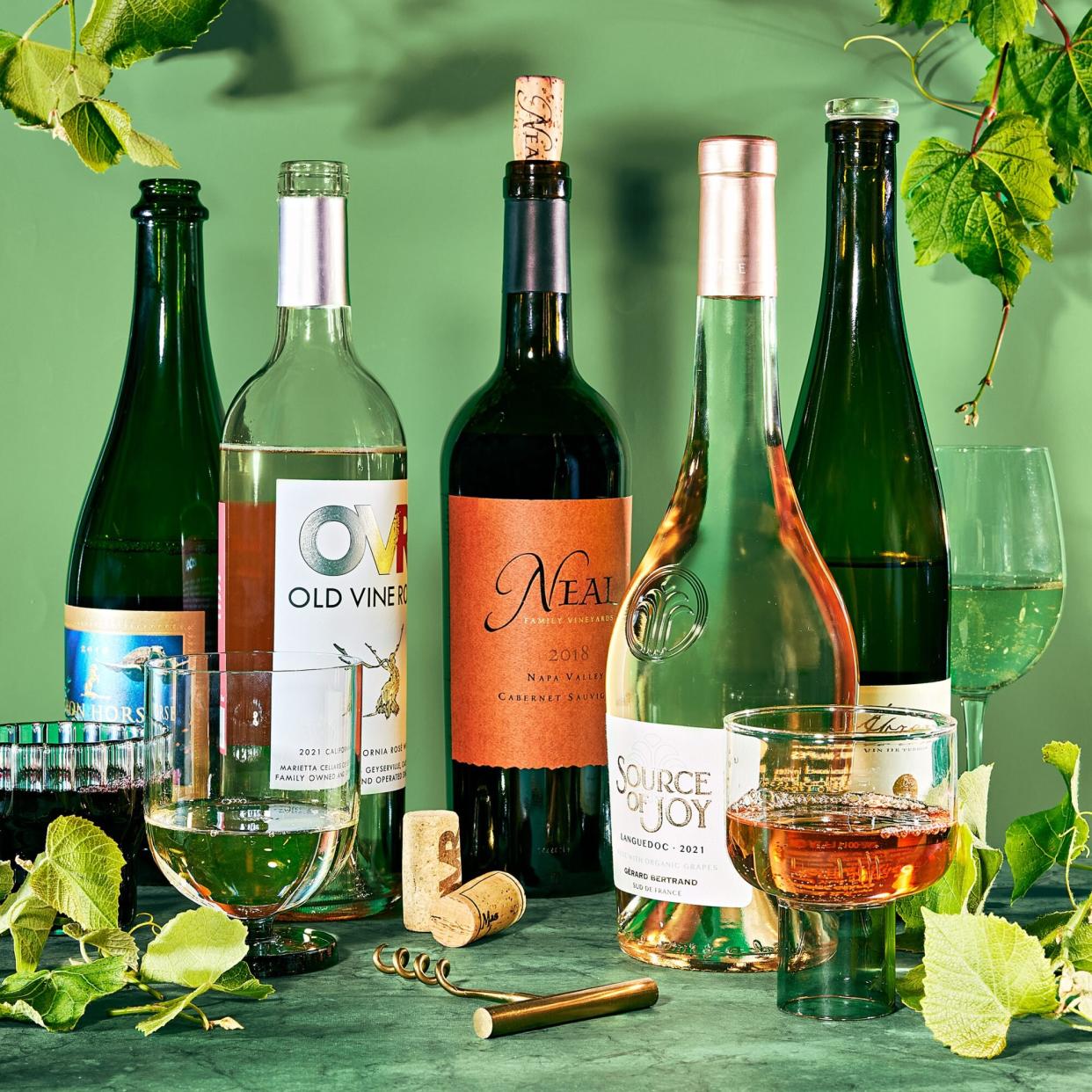
Photo by Jennifer Causey / Food Styling by Ali Ramee / Prop Styling by Lydia Pursell
There's no question that grape growers and winemakers—and wine lovers, for that matter—lean toward concern for the environment. Sustainable viticulture, despite the fuzzy nature of that term, is almost de rigueur; the number of wineries growing grapes organically increases every year; and more rigorous approaches like biodynamic and regenerative agriculture are more popular than ever, too.
The problem for wine buyers is that wine labels are utterly baffling in this regard. The U.S., E.U., Australia, and practically everywhere else all have different regulations about what "organic" means; there are dozens of different certifications and programs for sustainability and environmental friendliness of one kind or another; and, of course, there are categories like "clean" wine, which are more marketing plays than specific winemaking philosophies.
Here is a little distilled clarification on the terms. Sustainable agriculture is basically an approach with three main pillars: environmental protection (particularly in terms of conserving natural resources), social equity (workers' rights and fairness), and economic viability (you aren't sustainable if you go out of business). Organic farming concentrates on inputs and practices, prohibiting most synthetic fertilizers and pesticides, as well as the use of genetically modified seeds or crops. Biodynamic agriculture is more about removing the need for inputs by building life or vitality within the ecological whole of the farm—the vines, but also the soil, the local flora and fauna, and so on. (There's a somewhat controversial spiritual/astrological aspect to it as well, but that's a rough baseline.) Regenerative agriculture combines the tenets of organic farming with the broader aspects of sustainability: It doesn't allow for synthetic inputs, and it also promotes practices that help with carbon sequestration, biodiversity, and soil health, among many other goals.
But how do you know who's doing what? One solution is to visit the vineyard and talk to the proprietor to find out how they actually grow their grapes. Or visit the website and see what specific information you can find. Or look for the term "organically grown grapes" on the label, or the Demeter seal (the governing body for biodynamics), or one of the many sustainable certifications. Or, lastly—and I actually like this solution a lot—try one of the wines recommended here, because I already vetted them for you. When in doubt, an environment-obsessed wine editor is a handy thing to have around.
Sparkling
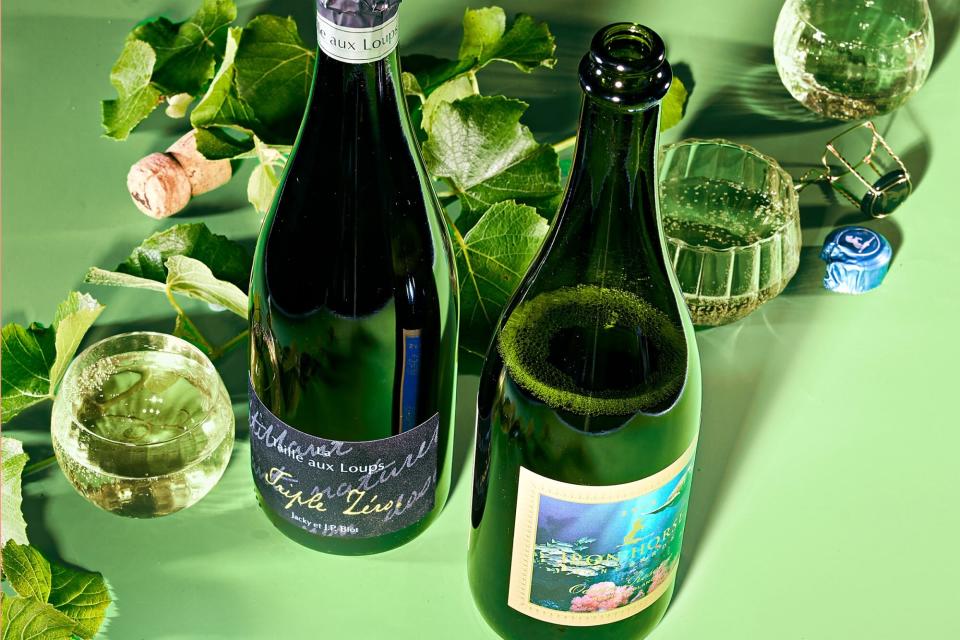
Photo by Jennifer Causey / Food Styling by Ali Ramee / Prop Styling by Lydia Pursell
2020 Raventós i Blanc Blanc de Blancs ($20)
Pepe Raventós has been farming biodynamically at his family's estate in Penedès since 2001. His blanc de blancs—crisp, vibrant, and incredibly focused—remains one of the world's great values in sparkling wine.
2014 Recaredo Terrers Brut Nature ($40)
In 1999, Spain's Recaredo started farming organically and in 2006 shifted to biodynamics. "Organic agriculture kills with natural products, but biodynamics brings life," winemaker Ton Mata says. Either way, these are some of the best Spanish sparkling wines to be found.
2018 Iron Horse Ocean Reserve ($59)
Sonoma County's acclaimed sparkling wine producer Iron Horse upped its sustainability game when it launched this green apple–scented cuvée. Five dollars from every bottle goes to Mission Blue to help establish marine protected areas.
NV Domaine de la Taille Aux Loups Triple Zéro ($35)
Loire winemaker Jacky Blot has been farming organically for decades, during which time he's also been making some of the Montlouis appellation's most compelling wines. Chenin Blanc from 60- to 80-year-old vines goes into this steely, lime-zesty sparkling wine.
Red
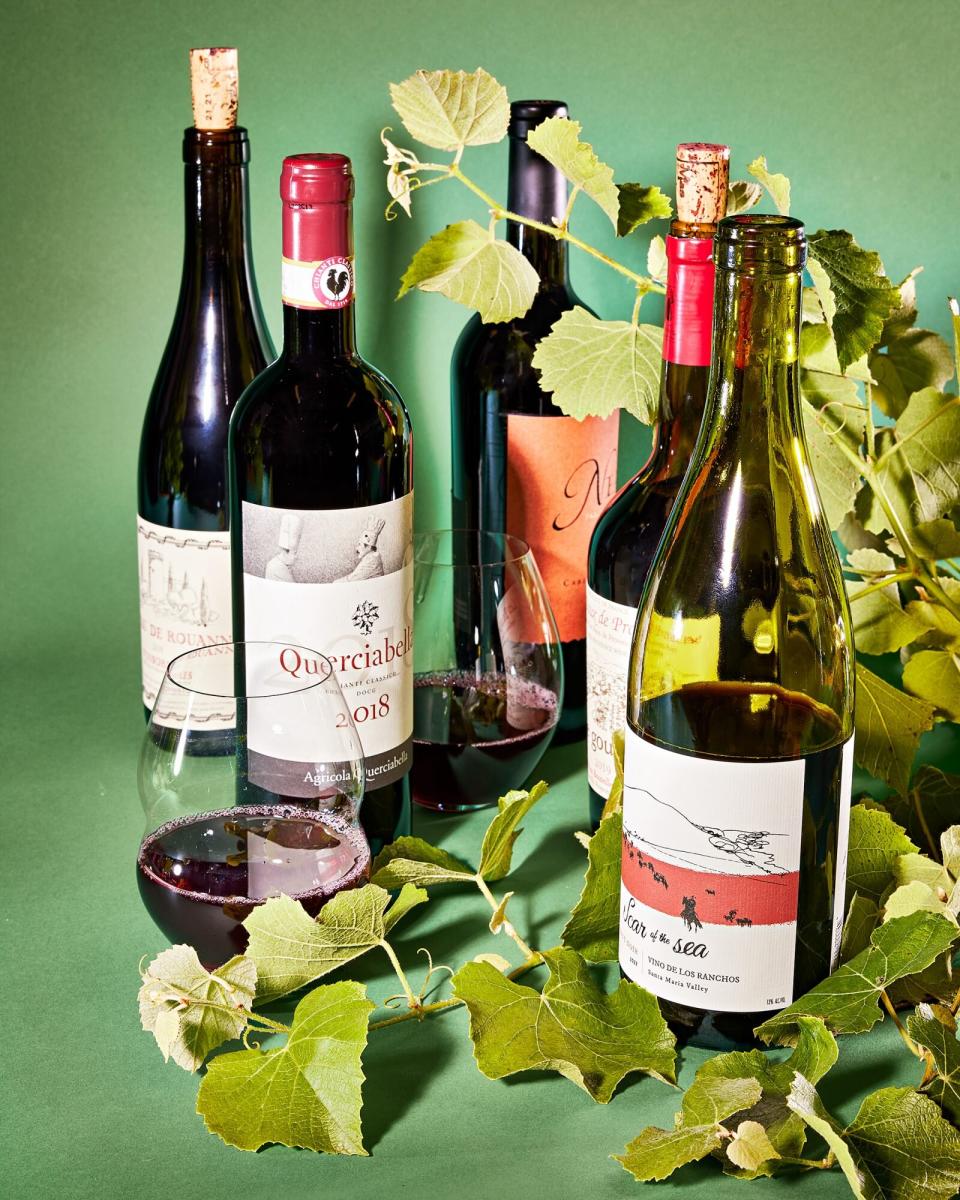
Photo by Jennifer Causey / Food Styling by Ali Ramee / Prop Styling by Lydia Pursell
2020 Mas de Gourgonnier Les Baux de Provence Rouge ($20)
The Cartier family's vineyards have been certified organic since the 1970s, making them one of the earliest wineries in Southern France to work this way. Their flagship red, combining Grenache, Syrah, and Cabernet Sauvignon, is rich, dark-fruited, and peppery.
2021 Scar of the Sea Vino de los Ranchos Pinot Noir ($29)
Mikey Giugni is making some of Southern California's most exciting wines from his small warehouse space off an industrial road in San Luis Obispo. For this elegant, red-fruited Pinot, he sources grapes from two organically farmed vineyards in the Santa Maria Valley.
2019 Château de Rouanne Vinsobres Rouge ($35)
Louis Barruol farms the Rhône vineyard he uses for this powerful, spicy red according to biodynamic principles but skips certification. "I like biodynamics in terms of what it brings to agriculture," he says. "But my spirituality is mine, and I don't need a guide for that."
2018 Neal Family Vineyards Napa Valley Cabernet sauvignon ($60)
Mark Neal manages hundreds of acres of vineyard land throughout Napa Valley and also farms his own vineyards (certified organic) both on Howell Mountain and in Rutherford. This cassis-rich red offers both valley-floor richness and mountain-vineyard structure; look also for his nectarine-scented 2021 Vermentino.
2018 Querciabella Chianti Classico ($31)
Sebastiano Castiglioni works biodynamically and since 2010 has also avoided the use of animal products of any kind at his Tuscan estate; he calls his approach "vegan biodynamics." The wines continue to be stellar, as this gorgeous, cherry-scented red shows.
2018 Clos Puy Arnaud Bordeaux ($29)
Biodynamics has been slow to catch on in Bordeaux, but proprietor Thierry Valette has been using its principles to guide his vineyard work since 2008. He also uses new oak barrels very modestly (about 15%), letting this wine's currant, plum, and herb notes shine through.
White
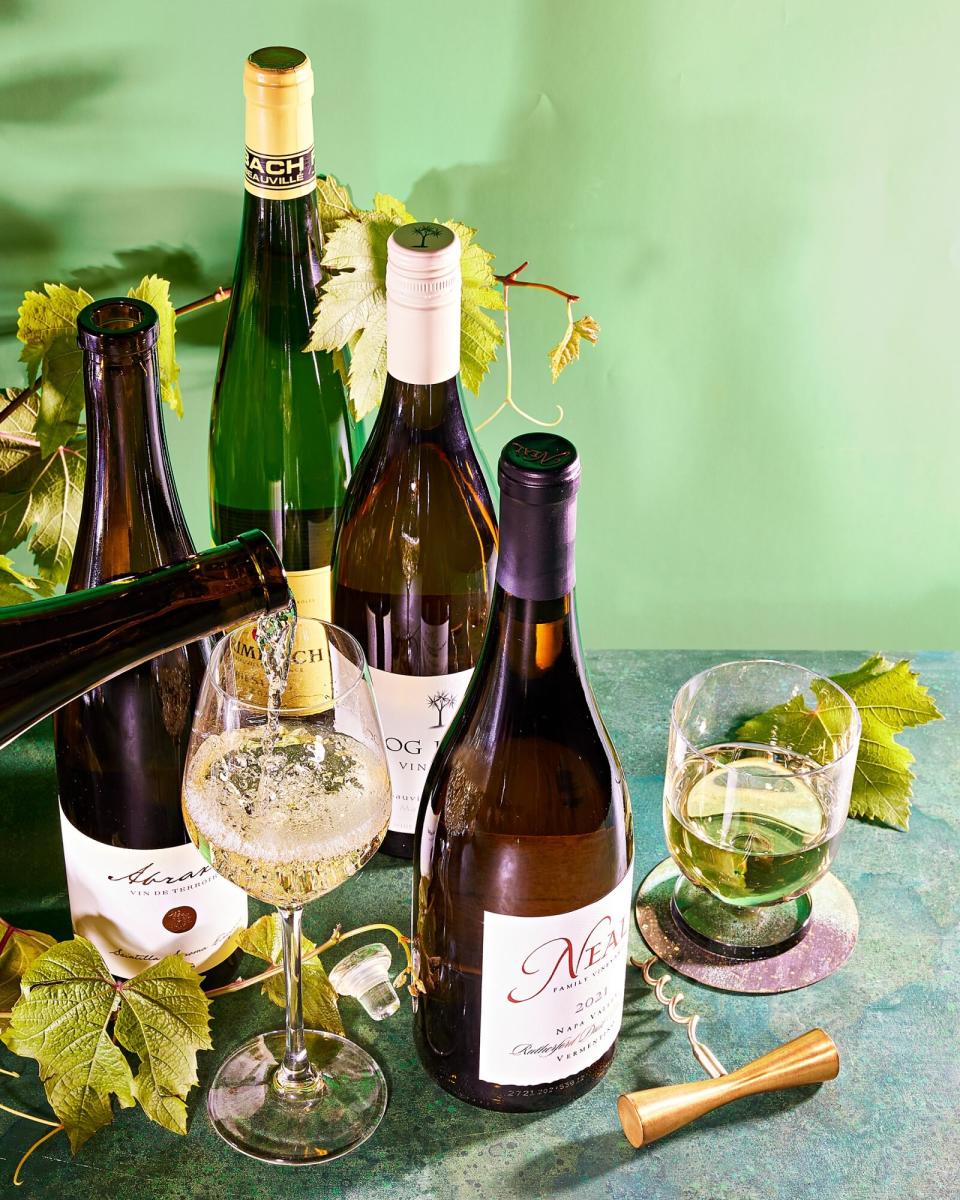
Photo by Jennifer Causey / Food Styling by Ali Ramee / Prop Styling by Lydia Pursell
2019 Pax Buddha's Dharma Vineyard Chenin Blanc ($36)
Winemaker Pax Mahle uses grapes from a dry-farmed, synthetic chemical–free vineyard east of Ukiah, California (at the base of Enlighten-ment Mountain; no joke), for this vivid white. Think ripe stone-fruit flavors bound by taut acidity.
2016 Trimbach Réserve Riesling ($32)
The Trimbach family of Alsace has been farming their estate vineyards organically since 2008. "Even before that," Jean Trimbach says, "we used no pesticides. We just didn't see a need to talk about it." The Trimbachs are famous for Riesling, and this cuvée shows why: It's minerally and intense, and (typical of their style) completely dry.
2018 Robert Sinskey Abraxas Scintilla Vineyard ($36)
Napa vintner Robert Sinskey has been working organically for over 35 years and promotes biodiversity by leaving sections of the estate dedicated to permanent wild areas. Abraxas, a blend of Riesling and other aromatic white grapes, offers floral notes above layers of apple, pear, and citrus flavors.
2019 Tablas Creek Vineyard Côtes de Tablas Blanc ($30)
The first U.S. vineyard to achieve Regenerative Organic Certified status, Tablas Creek in Paso Robles has been at the forefront of environ-mentally conscious grape growing since it was founded in 1989. This blend of Viognier, Marsanne, Grenache Blanc, and Roussanne bursts with notes of white peach and lemongrass.
2021 Dog Point Marlborough Sauvignon Blanc ($25)
Dog Point, with the largest certified organic vineyard in New Zealand, also brings in 2,500 sheep over the winter to control grass and weed growth. (Admittedly, sheep are not hard to come by in New Zealand.) And the wine is one of the country's best Sauvignons: zesty, grapefruity, and entirely refreshing.
Rosé
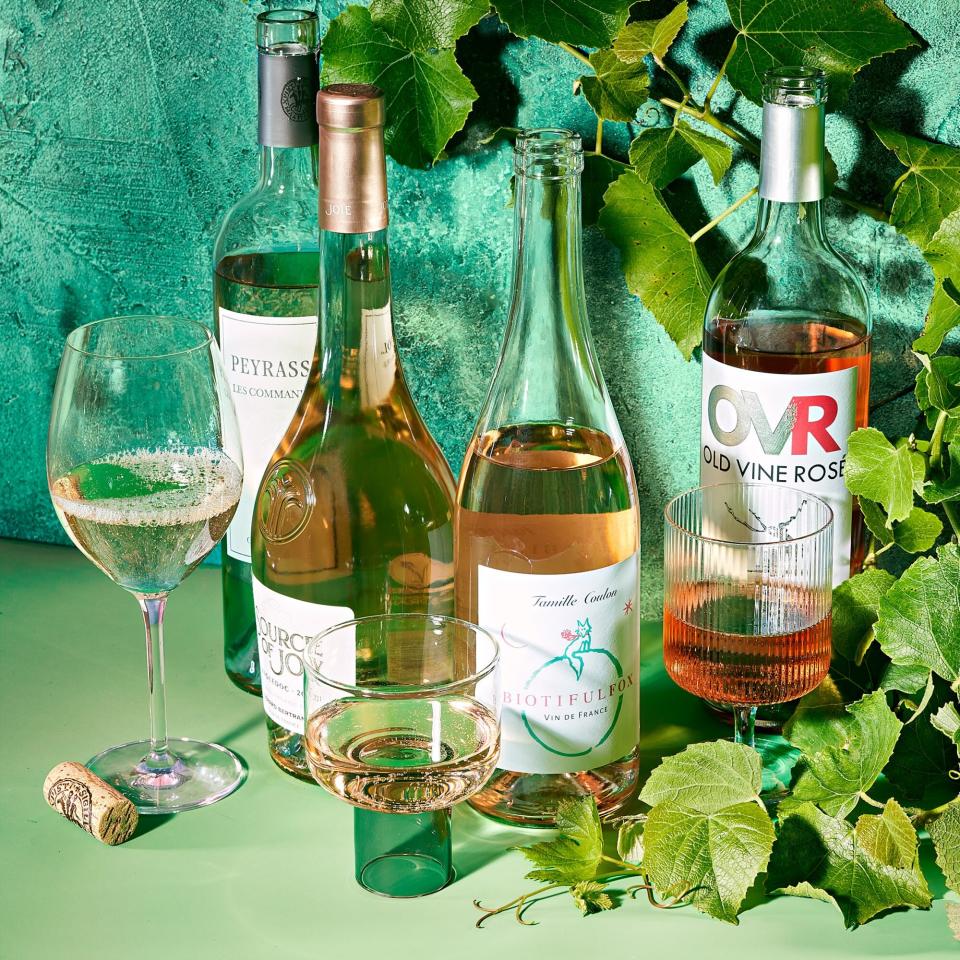
Photo by Jennifer Causey / Food Styling by Ali Ramee / Prop Styling by Lydia Pursell
2021 Gérard Bertrand Source of Joy Rosé ($20)
Former rugby player Gérard Bertrand farms over 2,100 acres of certified biodynamic vineyard land—more than anyone else in France—and also purchases fruit from organic vineyards for wines like this creamy, red-berried Languedoc rosé.
2021 Commanderie de Peyrassol les Commandeurs Rosé ($29)
Back in 1256, Peyrassol was farmed organically because there wasn't any other way to farm. (Round-up was hard to find in the Middle Ages.) It's still organic today, and its wine is classic Provençal rosé: pale pink, delicate, endlessly quaffable.
2021 Marietta cellars OVR Rosé ($19)
Scot Bilbro's vines at his McDowell Ranch in Mendocino are farmed organically, and some have been for a long time: Portions of the vineyard were planted in the 1880s. This transparent ruby old-vine rosé suggests fresh strawberries and cherries.
2021 Domaine de Beaurenard Biotiful FOX Rosé ($22)
Beaurenard has long been one of the top names in Châteauneuf-du-Pape. Not long ago, the estate launched a series of affordable, bio-dynamically farmed wines, among them this 100% Grenache rosé. It's floral and lively—and a steal at the price.

